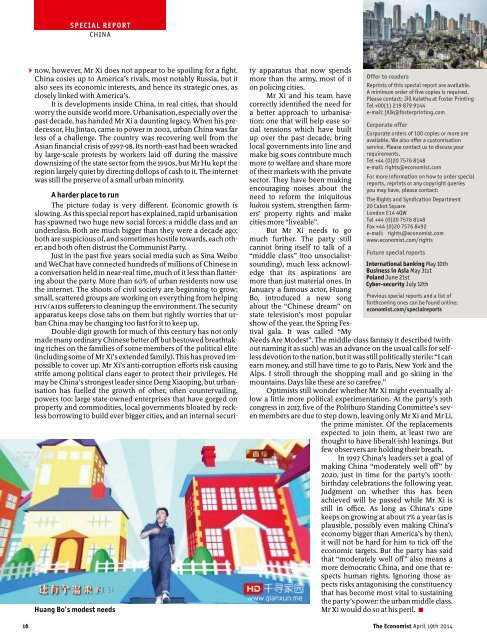The Economist - 19_25 April 2014
The Economist - 19_25 April 2014
The Economist - 19_25 April 2014
- No tags were found...
You also want an ePaper? Increase the reach of your titles
YUMPU automatically turns print PDFs into web optimized ePapers that Google loves.
SPECIAL REPORTCHINA2 now, however, Mr Xi does not appear to be spoiling for a fight.China cosies up to America’s rivals, most notably Russia, but italso sees its economic interests, and hence its strategic ones, asclosely linked with America’s.It is developments inside China, in real cities, that shouldworry the outside world more. Urbanisation, especially over thepast decade, has handed Mr Xi a daunting legacy. When his predecessor,Hu Jintao, came to power in 2002, urban China was farless of a challenge. <strong>The</strong> country was recovering well from theAsian financial crisis of<strong>19</strong>97-98. Its north-east had been wrackedby large-scale protests by workers laid off during the massivedownsizing of the state sector from the <strong>19</strong>90s, but Mr Hu kept theregion largely quiet by directing dollops ofcash to it. <strong>The</strong> internetwas still the preserve ofa small urban minority.A harder place to run<strong>The</strong> picture today is very different. Economic growth isslowing. As this special report has explained, rapid urbanisationhas spawned two huge new social forces: a middle class and anunderclass. Both are much bigger than they were a decade ago;both are suspicious of, and sometimes hostile towards, each other;and both often distrust the Communist Party.Just in the past five years social media such as Sina Weiboand WeChat have connected hundreds of millions of Chinese ina conversation held in near-real time, much of it less than flatteringabout the party. More than 60% of urban residents now usethe internet. <strong>The</strong> shoots of civil society are beginning to grow;small, scattered groups are working on everything from helpingHIV/AIDS sufferers to cleaning up the environment. <strong>The</strong> securityapparatus keeps close tabs on them but rightly worries that urbanChina may be changing too fast for it to keep up.Double-digit growth for much of this century has not onlymade many ordinary Chinese betteroffbut bestowed breathtakingriches on the families of some members of the political elite(including some ofMr Xi’s extended family). This has proved impossibleto cover up. Mr Xi’s anti-corruption efforts risk causingstrife among political clans eager to protect their privileges. Hemay be China’s strongest leader since Deng Xiaoping, but urbanisationhas fuelled the growth of other, often countervailing,powers too: large state-owned enterprises that have gorged onproperty and commodities, local governments bloated by recklessborrowing to build ever bigger cities, and an internal securi-Huang Bo’s modest needsty apparatus that now spendsmore than the army, most of iton policing cities.Mr Xi and his team havecorrectly identified the need fora better approach to urbanisation:one that will help ease socialtensions which have builtup over the past decade, bringlocal governments into line andmake big SOEs contribute muchmore to welfare and share moreof their markets with the privatesector. <strong>The</strong>y have been makingencouraging noises about theneed to reform the iniquitoushukou system, strengthen farmers’property rights and makecities more “liveable”.But Mr Xi needs to gomuch further. <strong>The</strong> party stillcannot bring itself to talk of a“middle class” (too unsocialistsounding),much less acknowledgethat its aspirations aremore than just material ones. InJanuary a famous actor, HuangBo, introduced a new songabout the “Chinese dream” onstate television’s most popularshow of the year, the Spring Festivalgala. It was called “MyOffer to readersReprints of this special report are available.A minimum order of five copies is required.Please contact: Jill Kaletha at Foster PrintingTel +00(1) 2<strong>19</strong> 879 9144e-mail: jillk@fosterprinting.comCorporate offerCorporate orders of 100 copies or more areavailable. We also offer a customisationservice. Please contact us to discuss yourrequirements.Tel +44 (0)20 7576 8148e-mail: rights@economist.comFor more information on how to order specialreports, reprints or any copyright queriesyou may have, please contact:<strong>The</strong> Rights and Syndication Department20 Cabot SquareLondon E14 4QWTel +44 (0)20 7576 8148Fax +44 (0)20 7576 8492e-mail: rights@economist.comwww.economist.com/rightsFuture special reportsInternational banking May 10thBusiness in Asia May 31stPoland June 21stCyber-security July 12thPrevious special reports and a list offorthcoming ones can be found online:economist.com/specialreportsNeeds Are Modest”. <strong>The</strong> middle-class fantasy it described (withoutnaming it as such) was an advance on the usual calls for selflessdevotionto the nation, butitwasstill politically sterile: “I canearn money, and still have time to go to Paris, New York and theAlps. I stroll through the shopping mall and go skiing in themountains. Days like these are so carefree.”Optimists still wonder whether Mr Xi might eventually allowa little more political experimentation. At the party’s <strong>19</strong>thcongress in 2017, five of the Politburo Standing Committee’s sevenmembers are due to step down, leaving only Mr Xi and Mr Li,the prime minister. Of the replacementsexpected to join them, at least two arethought to have liberal(-ish) leanings. Butfew observers are holding their breath.In <strong>19</strong>97 China’s leaders set a goal ofmaking China “moderately well off” by2020, just in time for the party’s 100thbirthdaycelebrations the following year.Judgment on whether this has beenachieved will be passed while Mr Xi isstill in office. As long as China’s GDPkeeps on growing at about 7% a year (as isplausible, possibly even making China’seconomy bigger than America’s by then),it will not be hard for him to tick off theeconomic targets. But the party has saidthat “moderately well off” also means amore democratic China, and one that respectshuman rights. Ignoring those aspectsrisks antagonising the constituencythat has become most vital to sustainingthe party’s power: the urban middle class.Mr Xi would do so at his peril. 716 <strong>The</strong> <strong>Economist</strong> <strong>April</strong> <strong>19</strong>th <strong>2014</strong>


